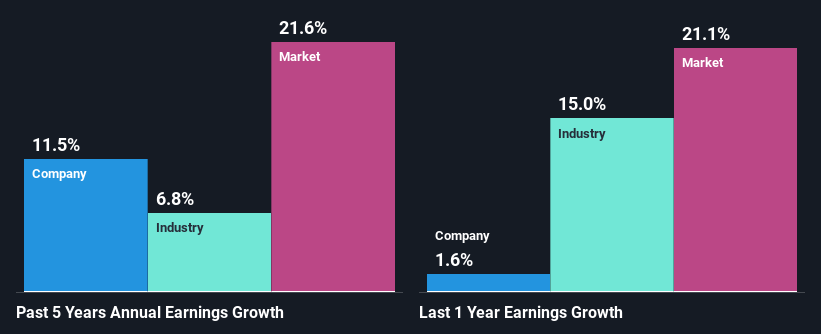- India
- /
- Personal Products
- /
- NSEI:HINDUNILVR
Hindustan Unilever Limited's (NSE:HINDUNILVR) Stock On An Uptrend: Could Fundamentals Be Driving The Momentum?
Hindustan Unilever (NSE:HINDUNILVR) has had a great run on the share market with its stock up by a significant 22% over the last three months. We wonder if and what role the company's financials play in that price change as a company's long-term fundamentals usually dictate market outcomes. In this article, we decided to focus on Hindustan Unilever's ROE.
ROE or return on equity is a useful tool to assess how effectively a company can generate returns on the investment it received from its shareholders. Simply put, it is used to assess the profitability of a company in relation to its equity capital.
See our latest analysis for Hindustan Unilever
How Do You Calculate Return On Equity?
The formula for return on equity is:
Return on Equity = Net Profit (from continuing operations) ÷ Shareholders' Equity
So, based on the above formula, the ROE for Hindustan Unilever is:
20% = ₹103b ÷ ₹514b (Based on the trailing twelve months to March 2024).
The 'return' is the income the business earned over the last year. So, this means that for every ₹1 of its shareholder's investments, the company generates a profit of ₹0.20.
What Has ROE Got To Do With Earnings Growth?
Thus far, we have learned that ROE measures how efficiently a company is generating its profits. Depending on how much of these profits the company reinvests or "retains", and how effectively it does so, we are then able to assess a company’s earnings growth potential. Generally speaking, other things being equal, firms with a high return on equity and profit retention, have a higher growth rate than firms that don’t share these attributes.
Hindustan Unilever's Earnings Growth And 20% ROE
At first glance, Hindustan Unilever seems to have a decent ROE. Further, the company's ROE compares quite favorably to the industry average of 12%. This certainly adds some context to Hindustan Unilever's decent 12% net income growth seen over the past five years.
As a next step, we compared Hindustan Unilever's net income growth with the industry, and pleasingly, we found that the growth seen by the company is higher than the average industry growth of 6.8%.

Earnings growth is an important metric to consider when valuing a stock. It’s important for an investor to know whether the market has priced in the company's expected earnings growth (or decline). This then helps them determine if the stock is placed for a bright or bleak future. One good indicator of expected earnings growth is the P/E ratio which determines the price the market is willing to pay for a stock based on its earnings prospects. So, you may want to check if Hindustan Unilever is trading on a high P/E or a low P/E, relative to its industry.
Is Hindustan Unilever Efficiently Re-investing Its Profits?
The high three-year median payout ratio of 90% (or a retention ratio of 10.0%) for Hindustan Unilever suggests that the company's growth wasn't really hampered despite it returning most of its income to its shareholders.
Besides, Hindustan Unilever has been paying dividends for at least ten years or more. This shows that the company is committed to sharing profits with its shareholders. Upon studying the latest analysts' consensus data, we found that the company is expected to keep paying out approximately 93% of its profits over the next three years. Still, forecasts suggest that Hindustan Unilever's future ROE will rise to 25% even though the the company's payout ratio is not expected to change by much.
Conclusion
On the whole, we do feel that Hindustan Unilever has some positive attributes. Namely, its high earnings growth, which was likely due to its high ROE. However, investors could have benefitted even more from the high ROE, had the company been reinvesting more of its earnings. As discussed earlier, the company is retaining hardly any of its profits. That being so, a study of the latest analyst forecasts show that the company is expected to see a slowdown in its future earnings growth. Are these analysts expectations based on the broad expectations for the industry, or on the company's fundamentals? Click here to be taken to our analyst's forecasts page for the company.
Valuation is complex, but we're here to simplify it.
Discover if Hindustan Unilever might be undervalued or overvalued with our detailed analysis, featuring fair value estimates, potential risks, dividends, insider trades, and its financial condition.
Access Free AnalysisHave feedback on this article? Concerned about the content? Get in touch with us directly. Alternatively, email editorial-team (at) simplywallst.com.
This article by Simply Wall St is general in nature. We provide commentary based on historical data and analyst forecasts only using an unbiased methodology and our articles are not intended to be financial advice. It does not constitute a recommendation to buy or sell any stock, and does not take account of your objectives, or your financial situation. We aim to bring you long-term focused analysis driven by fundamental data. Note that our analysis may not factor in the latest price-sensitive company announcements or qualitative material. Simply Wall St has no position in any stocks mentioned.
Have feedback on this article? Concerned about the content? Get in touch with us directly. Alternatively, email editorial-team@simplywallst.com
About NSEI:HINDUNILVR
Hindustan Unilever
A consumer good company, manufactures and sells food, home care, personal care, and refreshment products in India and internationally.
Flawless balance sheet with solid track record and pays a dividend.
Similar Companies
Market Insights
Community Narratives



